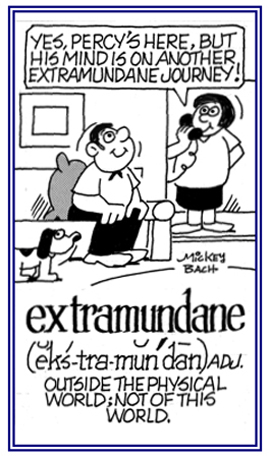anno mundi
(s) (noun) (no plural)
In the year of the world:
Anno mundi is a term for reckoning the passage of time from a fixed event.
Anno mundi, abbreviated A.M., marks the number of years that have passed since the world began. In the Hebrew tradition, the year of creation corresponds to 3761 B.C.
The Irish theologian, Ussher, in the mid-seventeenth century computed the date of creation as 4004 B.C.; therefore, the year A.D. 2000 corresponds to 5761 A.M. or 6004 A.M., depending on whose date of creation one might prefer.
antemundane, ante-mundane
(adjective); more antemundane, more ante-mundane; most antemundane, most ante-mundane
Pertaining to being or taking place before the creation of the world.
caput mundi
(s) (noun), caput mundis
(pl)
A reference to the head of the world or the center of the world:
Caput mundi was a reference to imperial Rome which was carried over to the papacy in medieval times.
Those who to stir up enthusiasm for their hometowns may use caput mundi in the same way the Romans did; that is, Rome was considered the capital of the world.
Dat eleemosynam et ecce omnia munda sunt vobis. (Latin motto)
Translation: "Give alms and lo, all pure things are yours!"
Someone was told that the motto of Wyggesden School, Leicester, U.K., Dat eleemosynam et ecce omnia munda sunt vobis must be memorized by all the students before they are allowed to graduate.
demimonde
(s) (noun), demimondes
(pl)
1. A class of women kept by wealthy lovers or protectors.
2. Women prostitutes considered as a group.
3. A class of woman not considered respectable because of indiscreet or promiscuous behavior.
4. A group whose respectability is dubious or whose success is marginal.
5. Etymology: from French demi-monde; consisting of demi-, "half" + monde, "world"; borrowed from Latin mundus, "world".
extramundane
(adjective), more extramundane, most extramundane
Relating to that which is occurring or existing outside and beyond our physical world: The book Grace was reading involved an
extramundane visitor from Mars who was visiting Earth to see if he could survive there any better than on his planet.
 © ALL rights are reserved.
© ALL rights are reserved.
Go to this Word A Day Revisited Index
so you can see more of Mickey Bach's cartoons.
Fiat justitia, pereat mundus. (Latin motto)
Translation: "Justice must prevail even if the world must perish over it."
Motto of German Emperor Ferdinand I (1556-1564).
inframundane
(adjective), more inframundane, most inframundane
A reference to that which is situated beneath or existing under the upper regions of the world: When something belongs to the inframundane areas, it is indicating the lower areas or infernal regions of the earth.
intermundane
(adjective), more intermundane, most intermundane
A reference to that which exists in the areas between other worlds or heavenly bodies: There are different intermundane spaces for planets and other astronomical bodies.
intramundane
(adjectivde), more intramundane, most intramundane
A reference to that which exists within the world; and so, belonging to the material world.
Lux mundi. (Latin motto)
Translation: "Light of the world."
Motto of Thiel College, Greenville, Pennsylvania, USA.
Lux mundi justitia. (Latin motto)
Translation: "Justice is the light of the world.{
Motto of Johann Georg I, Elector of Saxony (1585-1656).
monde
(s) (noun), mondes
(pl)
1. The world, people, society.
2. World; especially, of fashion; one's own little world.
mound
(s) (noun), mounds
(pl)
1. A pile of earth, gravel, sand, rocks, or debris heaped for protection or concealment.
2. A natural elevation; such as, a small hill.
3. A raised mass, as of hay; a heap.
4. In archaeology: A large artificial pile of earth or stones often marking a burial site.
5. Baseball: The slightly elevated pitcher's area in the center of the diamond.
6. Archaic: A hedge or fence.
7. Etymology: There are those who say that the English mound was influenced in form by mount, "hill, mountain".
mound
(verb), mounds; mounded; mounding
1. To heap into a raised mass of earth, gravel, rocks, and sand that is piled up for protection or for hiding something.
2. To make a large heap of earth or stones to mark a burial site in archaeological times.
3. In the game of baseball, making a slightly elevated pitcher's area in the center of the diamond.


